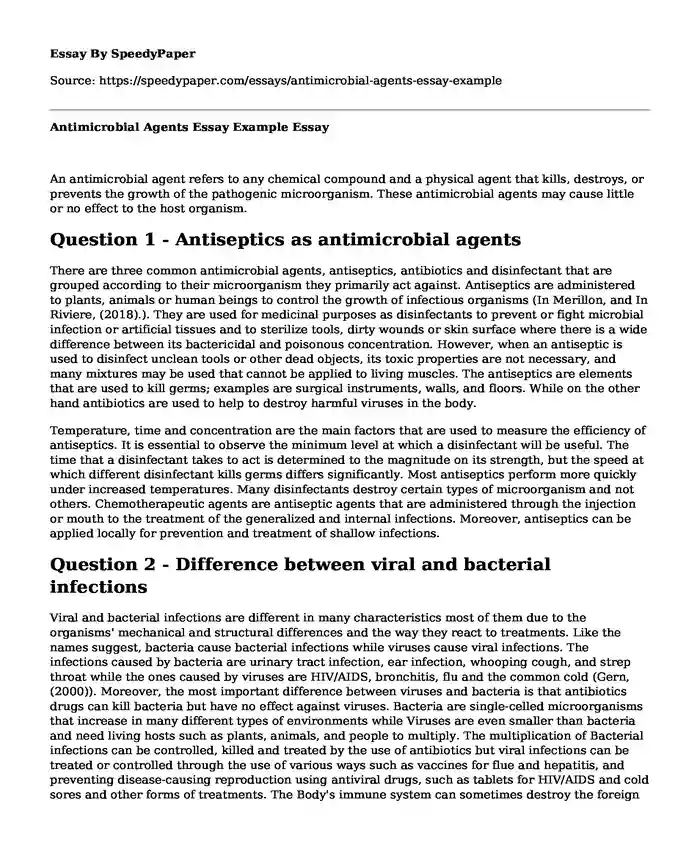An antimicrobial agent refers to any chemical compound and a physical agent that kills, destroys, or prevents the growth of the pathogenic microorganism. These antimicrobial agents may cause little or no effect to the host organism.
Question 1 - Antiseptics as antimicrobial agents
There are three common antimicrobial agents, antiseptics, antibiotics and disinfectant that are grouped according to their microorganism they primarily act against. Antiseptics are administered to plants, animals or human beings to control the growth of infectious organisms (In Merillon, and In Riviere, (2018).). They are used for medicinal purposes as disinfectants to prevent or fight microbial infection or artificial tissues and to sterilize tools, dirty wounds or skin surface where there is a wide difference between its bactericidal and poisonous concentration. However, when an antiseptic is used to disinfect unclean tools or other dead objects, its toxic properties are not necessary, and many mixtures may be used that cannot be applied to living muscles. The antiseptics are elements that are used to kill germs; examples are surgical instruments, walls, and floors. While on the other hand antibiotics are used to help to destroy harmful viruses in the body.
Temperature, time and concentration are the main factors that are used to measure the efficiency of antiseptics. It is essential to observe the minimum level at which a disinfectant will be useful. The time that a disinfectant takes to act is determined to the magnitude on its strength, but the speed at which different disinfectant kills germs differs significantly. Most antiseptics perform more quickly under increased temperatures. Many disinfectants destroy certain types of microorganism and not others. Chemotherapeutic agents are antiseptic agents that are administered through the injection or mouth to the treatment of the generalized and internal infections. Moreover, antiseptics can be applied locally for prevention and treatment of shallow infections.
Question 2 - Difference between viral and bacterial infections
Viral and bacterial infections are different in many characteristics most of them due to the organisms' mechanical and structural differences and the way they react to treatments. Like the names suggest, bacteria cause bacterial infections while viruses cause viral infections. The infections caused by bacteria are urinary tract infection, ear infection, whooping cough, and strep throat while the ones caused by viruses are HIV/AIDS, bronchitis, flu and the common cold (Gern, (2000)). Moreover, the most important difference between viruses and bacteria is that antibiotics drugs can kill bacteria but have no effect against viruses. Bacteria are single-celled microorganisms that increase in many different types of environments while Viruses are even smaller than bacteria and need living hosts such as plants, animals, and people to multiply. The multiplication of Bacterial infections can be controlled, killed and treated by the use of antibiotics but viral infections can be treated or controlled through the use of various ways such as vaccines for flue and hepatitis, and preventing disease-causing reproduction using antiviral drugs, such as tablets for HIV/AIDS and cold sores and other forms of treatments. The Body's immune system can sometimes destroy the foreign microbes even without medicinal interference. Nevertheless, some bacterial infections are severe such as Sepsis and meningitis. Unlike viral infections that shows many symptoms such as a cough, sniffles, achiness and sore throat, bacterial infections usually a focused misery such an extremely sore throat or severe painful ear.
Question 3 - Selecting the appropriate antimicrobial agent to avoid drugs resistance
Proper identification of bacterial and viral infections is a key to selecting the appropriate antimicrobial agent to avoid drug resistance of the microorganism that causes the diseases. The majority of the organisms creating the bacterial and viral infections have evolved to become resistant to antimicrobial agents and lacks appropriate identification (Steinbrenner, Quraishy, Dkhil, Wunderlich & Sies, 2015). Therefore, lack of proper identification can lead to failure of treatment of the infections. Moreover, adequate identification enables suitable vaccination to prevent the microorganism from causing diseases. The inappropriate use of antibiotics such as applying it to treat the common cold which is caused by the failure to complete medication and viruses can boost and encourage the growth of a resistant strain which is more challenging to manage. There have been cases of patient with viral diseases such as the common cold and flu are given antibiotics which are only prescribed for bacterial infections.
Generally, it is utmost important to understand and identify the symptoms of the viral and bacterial diseases at an early phase to know when to consult infectious disease specialists for control guidance, and to be able to identify situations when antimicrobial treatment is not needed and prevent the development of resistance and improve patient outcomes. Moreover once the symptoms of viral and bacterial symptoms are identified people should consult a healthcare specialist. People should understand the cause of diseases so that they can avoid prescription of antibiotics when not necessary because different diseases causing microorganism have varying characteristics which necessitate a specific treatment method.
References
Gern, J. E. (2000). Viral and bacterial infections in the development and progression of asthma. Journal of allergy and clinical immunology, 105(2), S497-S502.
In Merillon, J. M., & In Riviere, C. (2018). Natural antimicrobial agents.
Steinbrenner, H., Al-Quraishy, S., Dkhil, M. A., Wunderlich, F., & Sies, H. (2015). Dietary selenium in adjuvant therapy of viral and bacterial infections. Advances in nutrition, 6(1), 73-82.
Cite this page
Antimicrobial Agents Essay Example. (2022, Aug 18). Retrieved from https://speedypaper.com/essays/antimicrobial-agents-essay-example
Request Removal
If you are the original author of this essay and no longer wish to have it published on the SpeedyPaper website, please click below to request its removal:
- Free Essay about Roosevelt Franklin
- John Proctor
- Essay Example: Mega Mind Character Analysis
- Free Essay: Analysis of Negative Work Culture in the Staff with High Levels of Sick Leave and Poor Attendance
- Essay Sample on Face Perception during First Two Years
- Essay Example on Adopting Older versus Younger Children
- Paper Example. The Health Conditions of the Married and Unmarried People
Popular categories





